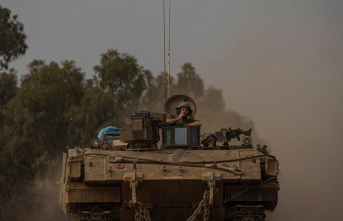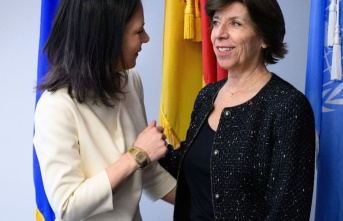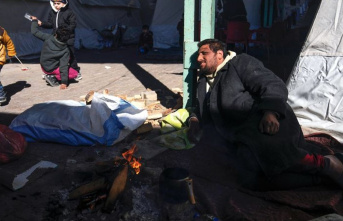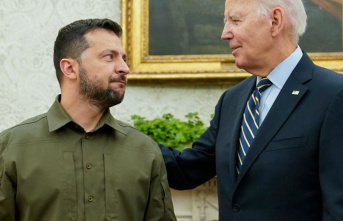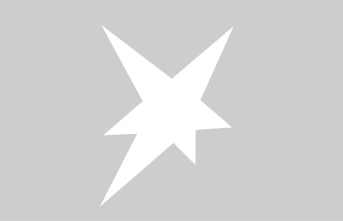Climbing athlete Elnas Rekabi was enthusiastically received in Tehran after her sudden disappearance at the Asian Championships in Seoul.
As the Iranian news agency Tasnim reported, the 33-year-old arrived in the capital Tehran on Wednesday morning. In the final of the Asian Championships in South Korea, Rekabi caused a stir because she competed without a headscarf.
Numerous images on social media showed how they welcomed people at Tehran Airport and cheered their action. The videos could not initially be independently verified. Her action in Seoul was seen by many as solidarity with anti-system protests in Iran. Islamic clothing is compulsory for female athletes in the Iranian national team. After her performance in Seoul, she suddenly disappeared.
Iran asserts: No consequences for Rekabi
Iranian representatives assured the International Olympic Committee and the World Association IFSC that the sport climber Elnaz Rekabi had "no consequences" to fear after her performance in Seoul. This was announced by the IOC on Wednesday after a meeting with Iran's National Olympic Committee. According to information from the NOK, Rekabi has now returned to Iran and is with her family in Tehran. You can continue to train and participate in competitions, it said. Critics had previously expressed great concern about Rekabi's safety.
The system-critical mass protests were triggered by the death of the 22-year-old Iranian Kurd Mahsa Amini. The moral police had arrested her because she allegedly did not comply with the mandatory rules for wearing a headscarf. The woman died in police custody on September 16. Since her death, thousands have been demonstrating across the country against the government's repressive course and the Islamic system of rule.
Rekabi apologizes in TV interview
In a TV interview at the airport, Rekabi apologized for not wearing a headscarf. It happened "unintentionally". Accordingly, she also apologized for the concerns she had caused. Observers interpret the apology as a forced statement. The Iranian authorities regularly exert pressure. Persian-language media also reported that Rekabi's brother had been arrested.
According to media reports, Rekabi's team left the hotel on Monday morning. It is not known what happened to her first. Rekabi's passport and mobile phone are said to have been confiscated, and there was also talk of an arrest. The Iranian embassy in Seoul categorically rejected such reports.
Iran's National Olympic Committee (NOC) assured the International Olympic Committee (IOC) and the world association IFSC at a meeting on Wednesday that Rekabi had "no consequences" to fear, the IOC said. According to the NOK, Rekabi has now returned to Iran and is with her family in Tehran. You can continue to train and participate in competitions, it said. According to the IOC, after the meeting in Seoul there was a telephone conversation with Rekabi. The committee will continue to monitor the situation.
sanctions against Iran called for
The interest group Athleten Deutschland demanded that the IOC and world sport impose sanctions on Iran. This also means that the world football association FIFA must "act consistently and consider Iran's exclusion from the World Cup". "The world association and the IOC must now do everything in their power to ensure Rekabi's protection and freedom," said Johannes Herber, managing director of the association.
Meanwhile, in response to the sanctions, Iran put more than a dozen British individuals and entities on a terrorist list. Sanctions were imposed on the British secret service GCHQ, London-based Persian-language media houses such as BBC Persian and Iran International, as well as politicians and officers, as Iran's Foreign Ministry announced on Wednesday. The sanctions include entry bans and asset freezes within the jurisdiction of Iranian authorities. Iran blames them for "violence and acts of terrorism."
EU responds to violent repression of protests
The EU imposed sanctions on the Iranian moral police and more than a dozen other people and organizations on Monday. With the punitive measures, the EU reacted to the violent repression of protests in the country. Iran's Information Minister Issa Sarepur, the Basij militias and the cyber defense command of the Islamic Revolutionary Guards were also affected.
Sarepur warned Iranians against using secure network connections (VPN) on Wednesday. He described the sale as illegal, even if it is currently not being criminalized. Sarepur was sanctioned by the EU on Monday because, as information minister, he is said to have played a key role in restricting the Internet. Since the nationwide protests in Iran, the Internet has been regularly disrupted or shut down, and several popular apps such as Instagram and Whatsapp have also been blocked. With the VPN connections, the blocks can be bypassed.
Fars: German embassy shares responsibility for protests
Iranian media have blamed the German embassy in Tehran for the nationwide protests against the government. In an article on Wednesday, the Fars news agency accused the diplomatic mission of fueling the protests. However, the agency, which is said to be close to the Revolutionary Guards, did not provide any evidence. The British and French embassies were also criticized. In the past few weeks, the Iranian government had already accused the West of supporting the protests.


